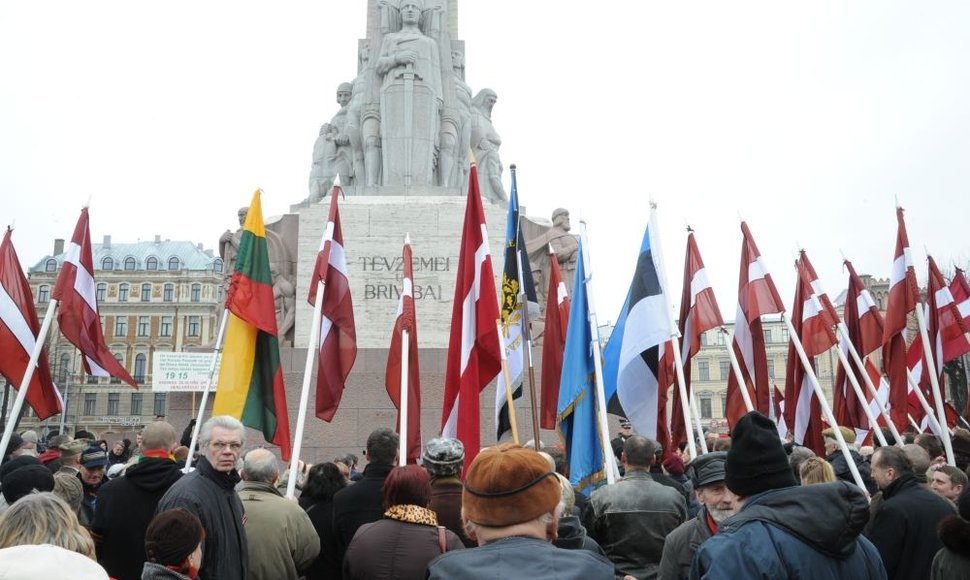The photos of eight youngsters carrying three Lithuanian flags in Riga got only negative comments on Lithuania’s news site 15min.lt. “Our fathers and grandfathers fought against the Nazis, while these bastards worship Nazis,” wrote “Arno.”
“That action could be held in a crematorium, because the end of the existence of the Baltic nations was planned there,” wrote “lol.” “Who is washing their brains? Their parades look more awful than gay parades,” wrote “ttt.” However, it is important to notice that participants of the march in Riga were carrying posters where Nazi symbols were crossed out, together with Soviet symbols. It was an obvious suggestion that the Latvian legionnaires fought for Latvia, not for Nazi Germany, in the opinion of the march’s participants.
On March 10, the Moscow-based liberal radio Ekho Moskvy talked to Russian historian Oleg Budnitsky, director of the International Center for Russian and East European Jewish Studies, about the collaboration of Russians with Nazi Germany in the Nazi-occupied Russian territories. At the end of the program, the show’s host, Vitaly Dymarsky, asked Budnitsky if the Latvian SS legion should be described as collaborators too. Budnitsky was reluctant to answer positively. “It is a complicated issue,” Budnitsky answered.
Back in 1944, it would have been advisable for the young Latvians and Estonians not join the so-called SS ‘volunteer’ legions (which were in actuality forced conscriptions into the military), but to save themselves for the post-WWII anti-Soviet guerilla war instead (such Lithuanian tactics were one of the reasons why Lithuania received so few immigrants from the East), though maybe it is easy to give advice from a historical distance.
Valdas Adamkus, Vytautas Landsbergis and the elder brother of the latter, Gabrielius Zemkalnis-Landsbergis, being teenagers in Nazi-occupied Kaunas, practiced using a pistol by shooting from the Landsbergis family house window, at the neighboring house’s wall. They were preparing to fight against the Soviets. In 1944, 15-year-old Zemkalnis-Landsbergis was arrested by the Gestapo for his underground activity for the independence of Lithuania. It is worth noticing that Landsbergis’ mother participated in a secret chain of Lithuanians saving Jews from the Nazis. Therefore, it was clear for the average Lithuanian – Nazis are not friends.
Although the national sport of Lithuanians is throwing mud (at the mental level) at state leaders and there are, of course, always plenty of really justifiable reasons for it, Lithuanians can be proud of their state leaders of all times, when speaking about the attitude of these leaders to ethnic minorities. If not for the Nazi occupation, not a single Jew or Roma would have been killed for his or her ethnicity. In February, Alfonsas Eidintas, diplomat (former Lithuanian ambassador in Israel and Norway) and historian, presented his book about the closest circle of pre-WWII Lithuanian President Antanas Smetona. Eidintas wrote one section about Smetona’s view on Jews and Poles, because he was so fascinated by Smetona’s liberal attitude to ethnic minorities and other nationalities in times when open racism became a norm in many European countries. Smetona even spoke in Polish with Polish diplomats, although Poland was Lithuania’s enemy No. 1 due to the occupation of Vilnius. Even his wife, whose native language was Polish, refused to speak Polish with Polish diplomats and spoke with them in French instead.
Thanks to all those leaders mentioned above, there are no real ethnic tensions in Lithuania, although maybe such tensions exist in the head of Valdemar Tomasevski. His desperate pan-Slavic election campaign show (mostly held for Polish TV, which is the propaganda sponsor of his actions) of March 17 in the streets of Vilnius will achieve not much. His statements that some ethnic minority parents are not happy with more Lithuanian language for their children in Slavic schools are ridiculous. The absolute majority of Lithuania’s Slavs do not vote for him, and common sense is sometimes more important than the opinions of some strange parents.
On March 17, delfi.lt published an article on a girl named Bozena. Her Polish mother and Roma-origin father lived with her in the Roma settlement of Kirtimai, near Vilnius. Her father did not allow her to go to school because it contradicted his traditional Roma values, in the way he understood them. Now Bozena decided to reject some of her father’s views: she divorced out of a marriage arranged by her father, left Kirtimai, married a Lithuanian, now attends a school for adults, works in Roma integration-related projects, and she is proud of herself. The traditional values of some parents are not always wise.












